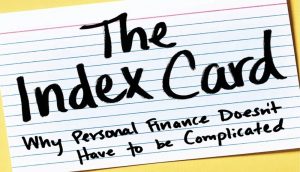Your whole life, you’ve probably been told that managing your finances was complicated. Maybe your parents didn’t come right out and say it, but the message our society feeds us about money is loud and clear – it’s confusing! Why else would entire channels, like CNN Money and Fox Business be devoted to it? Why would we need experts to tell us which stocks to pick? Why are there thousands of books and blogs and even websites like WIFE.org dedicated to telling you how to create a budget, how to save for retirement, how to pay for college for the kids, etc.?
One person thinks that staying on financial track doesn’t have to be hard at all. In fact, he proved it by writing down every financial rule you need to follow…on an index card.
Introducing The Index Card
 The man is Harold Pollack, a professor of public policy at the University of Chicago. When he posted the card on his blog in 2013, it took the financial world by storm. Now, Pollack and co-author Helaine Olen have a new book out, called The Index Card, which breaks down each rule in more detail.
The man is Harold Pollack, a professor of public policy at the University of Chicago. When he posted the card on his blog in 2013, it took the financial world by storm. Now, Pollack and co-author Helaine Olen have a new book out, called The Index Card, which breaks down each rule in more detail.
The beauty of Pollack’s index card is that it embraces the notion that developing a few good financial habits and sticking to them is what it takes for most people to achieve financial security. In fact, a lot of the “financial experts” and shows dedicated to finance can make money seem purposefully confusing to intentionally overwhelm people and force them to seek expensive services. All this confusion also convinces a lot of people to just give up or to cobble together their own financial systems that may or may not benefit them.
So, what does Pollack’s index card actually say? His rules are:
- Max your 401(k) or equivalent employee contribution.
- Buy inexpensive, well-diversified mutual funds such as Vanguard Target 20XX funds.
- Never buy or sell an individual security.
- Save 20% of your money (Pollack revised this in his book to 10% – 20%).
- Pay your credit card balance in full every month.
- Maximize tax-advantaged savings vehicles, like Roth, SEP, and 529 accounts.
- Pay attention to fees. Avoid actively managed funds.
- Make your financial advisor commit to a fiduciary standard.
- Promote social insurance programs to help people when things go wrong.
Some of these rules require a little more explanation. For example, how do you find an inexpensive, well-diversified mutual fund? What is a fiduciary standard? What is an SEP?
While we don’t have space in this article to go into detail about each step, we have written about many of these topics separately. Also, if you’d like to know more information, consider purchasing Pollack’s book.
The main takeaway, and the point Pollack was trying to make all along, is that finance doesn’t have to be confusing or scary. You don’t need to be a certified financial expert or to understand arcane stock market lingo to get ahead. Sticking with a few simple (heck, call them what they are – boring) rules is all that it really takes!
Need a little more help understanding and following these rules? Consider starting a Money Club near you to receive support and lots of great information.
Keep Reading:
